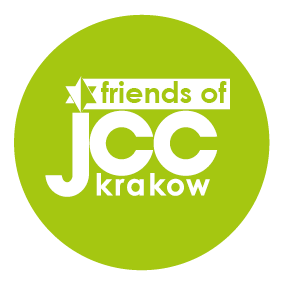OPINION: On the doorstep of Auschwitz, Krakow is building a Jewish future
May 12, 2014
By Agnieszka Giś
Agnieszka Giś volunteers at JCC Krakow
I was born into a non-Jewish Polish family, but for a long time we lived in Kazimierz – the Jewish district of Krakow. If someone had asked me what came to mind about Jews, I’d have probably said people dressed in black with beards and sidelocks: the pre-war image of an Orthodox Jew.
I'd also have said the Holocaust – specifically, images of Auschwitz. With so many Nazi camps in Poland, Jewish life here is associated more with death. Since becoming a volunteer for the Jewish Community Centre (JCC) in Krakow, I’ve have realised this is an unfair representation.
When I was young, a mysterious man dressed in black moved next door to us. On Friday nights, I could hear singing from our shared balcony. My parents explained about Jews, showed me around Krakow synagogues and told me of a great pre-war community. I became interested in this fascinating culture, but for a long time – especially after a school visit to Auschwitz – thought I could only learn about it through books and museums.
Then I found out about JCC Krakow during school workshops with Israeli youth and I fell in love with a place so different and diverse from anything I’d known before. Opened five years ago by Prince Charles and World Jewish Relief (WJR) and the Joint Distribution Committee, it has become a worldwide institution. It seeks to build a Jewish future in a city that, for most people is associated only with a dark past.
WJR started something unique and amazing and, as I learned more about the charity’s history, instrumental in organising the Kindertransports that saved almost 10,000 Jewish children, renewing communities and helping victims of wars and disasters all over the world, I decided I wanted to get involved and volunteer. I went to London to learn more about the history of Jews, their great strength and pertinacity, which led to surviving and rebuilding Jewish life in different communities, such as in Belarus, Ukraine, and Moldova.
JCC Krakow was dearest to my heart: Its existence is a reflection of something bigger that is happening all over Poland – Jewish life is being reborn and communities are developing. People are discovering their Jewish roots and learning what it means to be Jewish. This is one of the messages 200 UK participants of the March of the Living learned last week during Yom HaShoah.
The Polish Chief Rabbi is often asked how many Jews live in Poland. He always says he doesn’t know how many Jews live here today, but that he knows there will be more tomorrow. This sums up the complex character of the Jewish community in Poland. It is growing not only because more people have decided to convert, but because more people have started to discover their Jewishness.
Owing to the tragic events of the Second World War and the effects of communism in Poland, many people hid their Jewish identity and these families are now starting to identify with their roots. This is why JCC Krakow focuses mostly on the future, showing it is safe to be a Jew in Poland. If somebody isn’t sure what the discovery of their Jewish roots means for them, it is ready to create a space to learn.
The positive and welcoming attitude is evident: we have about 500 members and are gaining more each week. They are children, teenagers, students, parents and seniors with their own clubs and activities and a place to integrate, such as weekly Shabbat dinners.
This would not be possible without the efforts of about 50 volunteers who are helping every day to build a Jewish future in Krakow. Their presence, and the fact most of them, like me, are non-Jewish is incredibly special. Young people join Jewish cultural festivals as volunteers or participants and schools organise cleaning of Jewish cemeteries. The new Institute of Jewish Studies in Krakow welcomes everyone interested in deepening their knowledge of Jewish history and culture.
Anti-Semitism is frequently asked about by visitors here. There are incidents of anti-Semitism in every country, Poland included. But it is safe to walk around Krakow wearing a kippah, nothing happens when large groups of Chasidic Jews visit the graves of their tzadikim and the younger generations of Poles are becoming more accepting of the Jewish community.
This week we marked Yom Hashoah and before that, the 71st anniversary of the Warsaw Ghetto uprising. JCC Krakow is not only a place where the Jewish community has started to grow but is also an international symbol of hope.
Its existence says “let us not be judged by what happened to us but rather how we deal with this and move on”. This vibrant place is on its way to building a Jewish future – in a place not far from Auschwitz.
• Agnieszka is a volunteer at the Krakow JCC and founder of the blog www.jewsofkrakow.com


